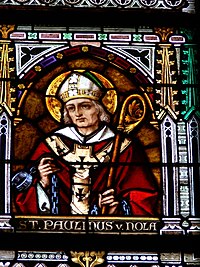Paulinus of Nola
| Saint Paulinus of Nola | |
|---|---|
 |
|
| Bishop & Confessor | |
| Born |
AD 354 Bordeaux, France |
| Died | June 22, 431 Nola, Campania, Italy |
| Venerated in |
Roman Catholic Church Orthodox Church |
| Feast | June 22 |
Paulinus of Nola (Italian: Paolino di Nola; c. 354 – June 22, AD 431), born Pontius Meropius Anicius Paulinus, was a Roman poet, scriptor, and senator who attained the ranks of suffect consul (c. 377) and governor of Campania (c. 380–1) but—following the assassination of the emperor Gratian and under the influence of his Spanish wife Therasia—abandoned his career, was baptized as a Christian, and (after Therasia's death) became bishop of Nola in Campania. While there, he wrote poems in honor of his predecessor St Felix and corresponded with other Christian leaders throughout the empire. He is traditionally credited with the introduction of bells to Christian worship and helped resolve the disputed election of Pope Boniface I.
His renunciation of his wealth and station in favor of an ascetic and philanthropic life was held up as an example by many of his contemporaries—including SS Augustine, Jerome, Martin, and Ambrose—and he was subsequently venerated as a saint. His relics became a focus of pilgrimage, but were removed from Nola between the 11th and 20th centuries. His feast day is observed on June 22 in both the Roman Catholic and Eastern Orthodox Churches. In Nola, the entire week around his feast day is celebrated as the Festival of the Lilies.
...
Wikipedia
